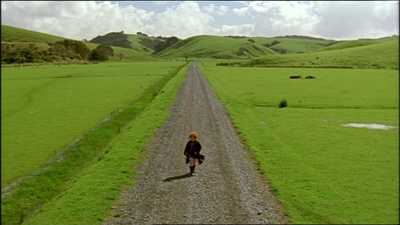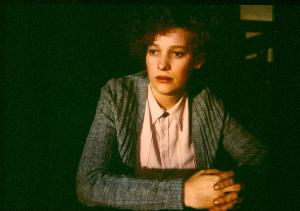A part of this viewing list: Criterion Collection Spine #301: Jane Campion’s An Angel at My Table.

Despite being hailed as one of the world’s best female film directors, I’ve been ultimately disappointed with Jane Campion. In regard to the technical aspects of her filmmaking I have nothing but praise, she is quite able to gather the people she needs to make her vision appear and to direct them to her goal, but to me at least, the content of her films leaves something to be desired. Perhaps this is because I’m a man. The Piano is a nearly perfect feminist film, but the last ten minutes cut the legs and a few more fingers from all the excellence that precedes it. And In the Cut is both a mailed-in thriller and a study in tactical misandry. An Angel at My Table is basically a cinematic version of The Bell Jar and it is based on the autobiogaphies of Janet Frame, who is essentially a Kiwi Sylvia Plath.
In my last semester of college I took a class called “Fictions of Insanity” which was supposed to be an English course on how insanity as a theme is used in literature. In actuality it was a course on how patriarchy drives women mad, taught by a grad student whose thesis was on the same subject, only in an even more specific area, how patriarchy drives women mad in the Victorian Novel. She appeared to read from her thesis instead of lecturing. Needless to say, I didn’t enjoy the class and ended up dropping it. I’ve now come to the conclusion that I don’t like it when any ‑ism focuses more on assigning blame than more constructive actions. I’m not saying that feminism does this, but that some feminists do, whether intentionally or not. I think Jane Campion knows better than to do this, but ends up forced into it by audience considerations. I mean that most viewers aren’t going to find autonomous agency very appealing. That kind of independence is certainly hard to achieve, if it is even possible; the ultimate failure of any of Campion’s heroines to achieve it and their inevitable reassimilation into society seems to say that there can be no victory, but there can be peace.
 This all fits in nicely with An Angel at My Table. Janet Frame has the “artistic temperament” but the demands of New Zealand society and culture create a strange childhood for her, as she is shuttled through the school system like a toaster on an assembly line and is time and time again set apart from the group. Her desire to be a writer and her obvious aptitude for the craft are supposed to be set aside for a “real job.” And fatherly men are constantly telling her what to do. Because she hasn’t been allowed to grow freely, she ends up in an asylum receiving shock treatments for 8 years. It later turns out that she was misdiagnosed as schizophrenic. [If anyone had actually paid attention to the wallflower they would have noticed she was just a little shy]. Not until she is allowed bits of freedom, including a trip to Europe does she learn that she is quite capable of taking care of herself, and that it is okay to be who she is. For Ms. Frame, that is enough. After she actualizes, she can happily make peace with her place in the world and finally live as a person, not a carrot-topped toaster.
This all fits in nicely with An Angel at My Table. Janet Frame has the “artistic temperament” but the demands of New Zealand society and culture create a strange childhood for her, as she is shuttled through the school system like a toaster on an assembly line and is time and time again set apart from the group. Her desire to be a writer and her obvious aptitude for the craft are supposed to be set aside for a “real job.” And fatherly men are constantly telling her what to do. Because she hasn’t been allowed to grow freely, she ends up in an asylum receiving shock treatments for 8 years. It later turns out that she was misdiagnosed as schizophrenic. [If anyone had actually paid attention to the wallflower they would have noticed she was just a little shy]. Not until she is allowed bits of freedom, including a trip to Europe does she learn that she is quite capable of taking care of herself, and that it is okay to be who she is. For Ms. Frame, that is enough. After she actualizes, she can happily make peace with her place in the world and finally live as a person, not a carrot-topped toaster.
Hey, it looks like a Campion heroine successfully finds contentment! Even if her agency is only lightly used as a result of her reclusiveness, at the end Ms. Frame’s satori is still obvious. Apart from being about an hour too long, this was a good movie.
• Criterion Essay by Amy Taubin
• Senses of Cinema lecture by Sue Gillet